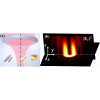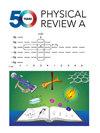Position-dependent plasmonic chirality of particles in tightly focused light field
IF 2.9
2区 物理与天体物理
Q2 Physics and Astronomy
引用次数: 0
Abstract
Plasmonic chirality garners considerable attention owing to its distinctive optical characteristics and wide-ranging applications. Understanding the optical activity of single particles holds paramount significance for both theoretical frameworks and experimental measurements of chirality. When probing the optical response of chiral particles, high numerical aperture (NA) objectives, adept at concentrating light into exceedingly small regions, are frequently employed. With escalating NA, the incident light no longer satisfies the paraxial approximation, engendering electric field components perpendicular to the focal plane. However, this electric field component is usually neglected in research. Here, we utilize angular spectrum theory to explore the optical response and circular dichroism of single chiral nanoparticles subjected to tightly focused circularly polarized light. Remarkably, we find that the electric field component perpendicular to the focal plane exhibits a pronounced influence on chirality, potentially inducing a reversed circular dichroism response when the particle deviates from the optical axis. Simultaneously, variations in the position of particles within the light field yield significant discrepancies in higher-order modes, particularly electric quadrupole moments. Our findings hold profound implications for the measurement and analysis of chiral particles, offering invaluable guidance for the future investigations of chirality.

紧聚焦光场中颗粒的位置依赖性等离子手性
质子手性因其独特的光学特性和广泛的应用而备受关注。了解单个粒子的光学活动对于手性的理论框架和实验测量都具有重要意义。在探测手性粒子的光学响应时,经常会用到高数值孔径(NA)物镜,它善于将光线集中到极小的区域。随着 NA 值的增加,入射光不再满足准轴向近似,从而产生垂直于焦平面的电场分量。然而,这种电场分量通常在研究中被忽略。在此,我们利用角光谱理论来探讨单个手性纳米粒子在紧聚焦圆偏振光下的光学响应和圆二色性。值得注意的是,我们发现垂直于焦平面的电场分量对手性有明显的影响,当粒子偏离光轴时,可能会引起反向的圆二色性响应。同时,粒子在光场内的位置变化会导致高阶模式,尤其是电四极矩出现显著差异。我们的发现对手性粒子的测量和分析具有深远的影响,为未来的手性研究提供了宝贵的指导。
本文章由计算机程序翻译,如有差异,请以英文原文为准。
求助全文
约1分钟内获得全文
求助全文
来源期刊

Physical Review A
物理-光学
CiteScore
5.40
自引率
24.10%
发文量
0
审稿时长
2.2 months
期刊介绍:
Physical Review A (PRA) publishes important developments in the rapidly evolving areas of atomic, molecular, and optical (AMO) physics, quantum information, and related fundamental concepts.
PRA covers atomic, molecular, and optical physics, foundations of quantum mechanics, and quantum information, including:
-Fundamental concepts
-Quantum information
-Atomic and molecular structure and dynamics; high-precision measurement
-Atomic and molecular collisions and interactions
-Atomic and molecular processes in external fields, including interactions with strong fields and short pulses
-Matter waves and collective properties of cold atoms and molecules
-Quantum optics, physics of lasers, nonlinear optics, and classical optics
 求助内容:
求助内容: 应助结果提醒方式:
应助结果提醒方式:


